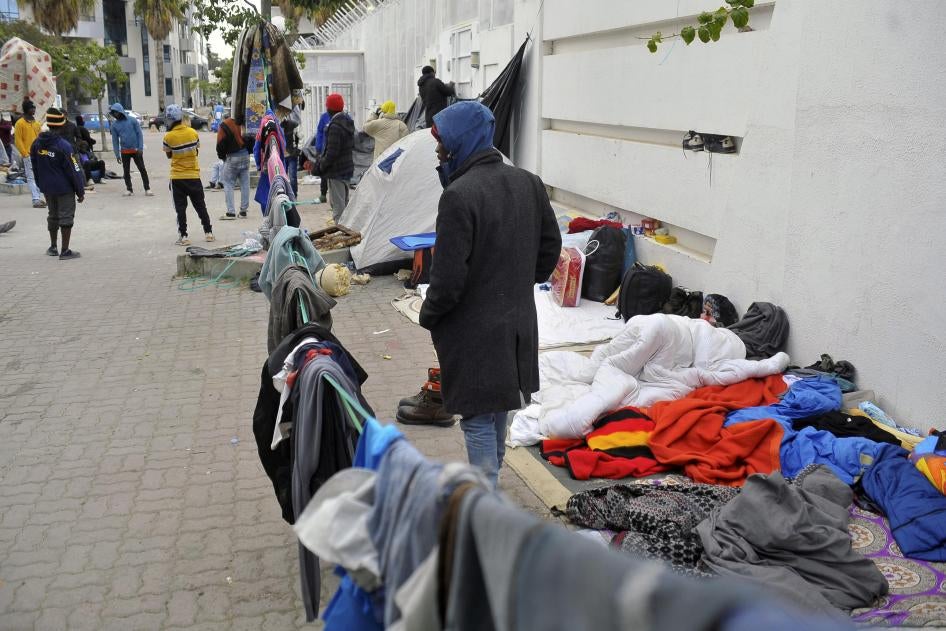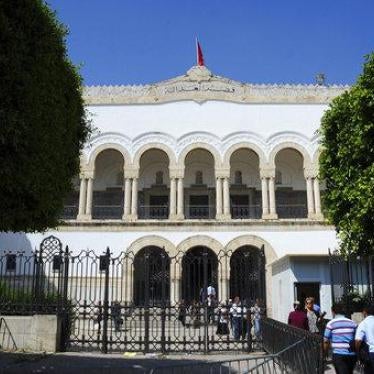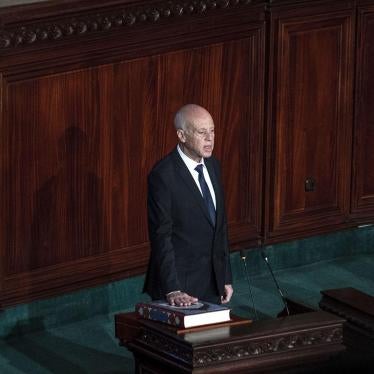(Tunis) – President Kais Saied’s recent attempt to mitigate the serious harm that a speech he made on February 21, 2023, caused Black African migrants, asylum seekers, and refugees in Tunisia does not go far enough, Human Rights Watch said today. Measures announced on March 5 fall far short of the steps needed to end a surge in violent assaults, robberies, and vandalism by Tunisian citizens, arbitrary evictions by landlords, and job terminations by employers, that followed Saied’s speech.
Meanwhile, scores of Black African foreigners, asylum seekers, and refugees, many of them suddenly homeless, remain camped out in front of international organizations’ headquarters, saying they feel safer there from assaults and arbitrary arrests than elsewhere in Tunisia. Others are keeping low profiles elsewhere, telling Human Rights Watch that they avoid venturing outside as much as possible.
“After fanning the flames of anti-immigrant violence, President Saied now offers only a spoonful of water to contain them,” said Salsabil Chellali, Tunisia director at Human Rights Watch. “The Tunisian government should immediately stop arbitrarily arresting Black African foreigners, review individual cases to ensure due process for everyone arrested, release those arbitrarily detained, and swiftly investigate and hold to account those responsible for racist attacks and abuses.”
Between February 24 and March 3, Human Rights Watch interviewed 16 nationals of West and Central African countries who live in Tunisia, documenting their accounts of being beaten, robbed, or otherwise abused since the president’s speech. They include seven migrant workers, six of whom are undocumented and one who is a legal resident; five students; and four asylum seekers registered with the United Nations High Commissioner for Refugees (UNHCR).
Thirteen of those interviewed said that Tunisians had assaulted, robbed, or discriminated against them or used racist slurs between February 21 and March 1. Since the president’s statements, 11 had been arbitrarily evicted, and 2 fled their homes fearing for their safety. Eight of the nine who had worked before the speech have not been allowed to work since and have lost all sources of income. Nearly all said that the president’s statements and the increase in racist attacks have left them worried for their safety and afraid to walk the streets.
A 2021 estimate put the number of foreigners from non-Maghreb African countries in Tunisia at over 21,000, in a country with a population of 12 million. About 7,200 are students in Tunisian schools, according to the Higher Education Ministry. UNHCR reported that 9,000 refugees and asylum seekers were registered in the country as of January, with the majority from the Ivory Coast, Syria, Cameroon, and Sudan, and smaller numbers of Guineans, Libyans, and other nationalities.
Beginning in early February, Tunisian police carried out arrests, seemingly targeting Black African foreigners based on their appearance or the neighborhoods in which they live. At least 850 were reportedly indiscriminately arrested, apparently based on racial profiling, according to the Tunisian chapter of Lawyers Without Borders (ASF).
Those arrested included both undocumented people and others with credentials, including some registered refugees and asylum seekers. On March 9, the African Students and Interns’ Association in Tunisia (AESAT) told Human Rights Watch that at least 44 students had been arrested since February 21, and some are still detained. More than 40 students reported violent attacks.
On February 21, Saied claimed that a “criminal plan” was aiming through “successive waves of irregular migration” to “alter Tunisia’s demographic make-up … to consider it solely African with no affiliation to the Arab or Islamic nations.” Referring to crime and undocumented migrants from Sub-Saharan Africa in the same breath, he ordered the authorities to strictly enforce the law regulating the presence of foreigners in Tunisia.
Black African foreigners in Tunisia have been the subject of sporadic racist assaults by Tunisians for years. But following the president’s speech, they have suffered a surge in attacks, reportedly often accompanied by robbery, along with evictions and job loss. According to ASF, instead of assisting victims, police arrested some undocumented migrants when they tried to report assaults.
On March 5, the presidency issued a statement rejecting “alleged racism” and listing planned measures “to facilitate the procedures for foreign residents and to protect various communities,” including streamlining registration for foreign students, facilitating voluntary repatriations, and a new hotline to report abuses.
However, the statement did not condemn the criminal assaults on Black migrants, or instruct the security forces to protect those at risk or prosecutors to hold accountable anyone suspected of carrying out criminal acts against foreigners. The authorities have announced only one arrest in the wave of assaults, creating an atmosphere of impunity that can embolden potential attackers.
The following are the accounts of three Black African foreign nationals in Tunisia Human Rights Watch interviewed.
A 20-year-old Malian studying international trade, has been in Tunisia since September 2020. On March 1, while on his way home from his first day of an internship in the center of Tunis, a man pulled out a razor blade and tried to slash him, yelling racist slurs and telling him to go back to “his” country. The student tried to defend himself but still ended up with cuts on his neck and chest.
He went to a police station with the dean of his school – who acted as an interpreter – to report the attack. The officers asked him what happened, handed him a transcript in Arabic with no relevant information on it and told him to go to the hospital, he said. Between February 21 and March 1, he had only left his dorm once to buy groceries because he felt he was in danger.
On February 27, a 17-year-old Cameroonian who is a UNHCR-registered asylum seeker, was evicted from his apartment in Ariana, north of the capital, even though he had paid his rent the day before. The same night, a group of men, apparently Tunisians, assaulted him and his roommates in the street with a knife and sticks, threw rocks at them, and robbed him. They were chanting, “Kill the Blacks” in French, which he understood, he said. He said the assailants stole his phone and cash.
He displayed an open wound on his Achilles tendon, bruises on his thigh, and slashes on the right sleeve and the back of his jacket, which he said were made by an assailant’s knife. Police watched the assault and did not intervene, he said. When he spoke to Human Rights Watch, he had been sleeping on a piece of cardboard in front of the Tunis office of the International Organization for Migration (IOM) since his eviction. He said that he fled the war in his country after all the members of his family were killed.
A woman from Ivory Coast who has 5-month-old twins has been in Tunisia since 2017 and holds a valid residency card. Early in February, she opened a beauty salon in the Sidi Amor neighborhood, north of the capital. She said that the proprietor, who had leased her the salon, later reneged on their agreement, claiming the police had said “Blacks cannot own a business.” The next morning, on February 24, she found the proprietor with six other men on the site destroying equipment and furniture with an axe.
On February 25, her landlord evicted her from her apartment in Raoued, telling her to “go back home.” She and her children have since been relying on friends for shelter, remaining indoors as much as possible due to fear. She also described discrimination in grocery stores, where she said merchants have arbitrarily raised the prices of basic commodities, such as rice, when she arrived at the checkout.
Experts and journalists have documented many other attacks and abuses in recent weeks. The attacks have been fueled by the significant rise in anti-Black rhetoric and hate speech on online platforms in recent months, partly driven by the Tunisian National Party (PNT), which has been calling for the deportation of all undocumented Sub-Saharan migrants. Online hate peaked between February 20 and 26, according to a report released on February 28 by the fact-checking platform Falso.
In 2018, Tunisia passed law 50 on the “elimination of all forms of racial discrimination,” pioneering legislation in the Middle East and North Africa region that criminalizes racial discrimination and provides prison sentences from a month to a year for racist comments or acts, and from one year to three for incitement to hatred or the dissemination of ideas based on racial discrimination or racial superiority by any means.
The International Convention on the Elimination of All Forms of Racial Discrimination, to which Tunisia is a state party, obligates countries to “condemn racial discrimination” and undertake measures aimed at “eliminating racial discrimination in all its forms and promoting understanding among all races.” It says that countries need to “prohibit and bring to an end, by all appropriate means ... racial discrimination by any persons, group, or organization” and “discourage anything which tends to strengthen racial division.”









